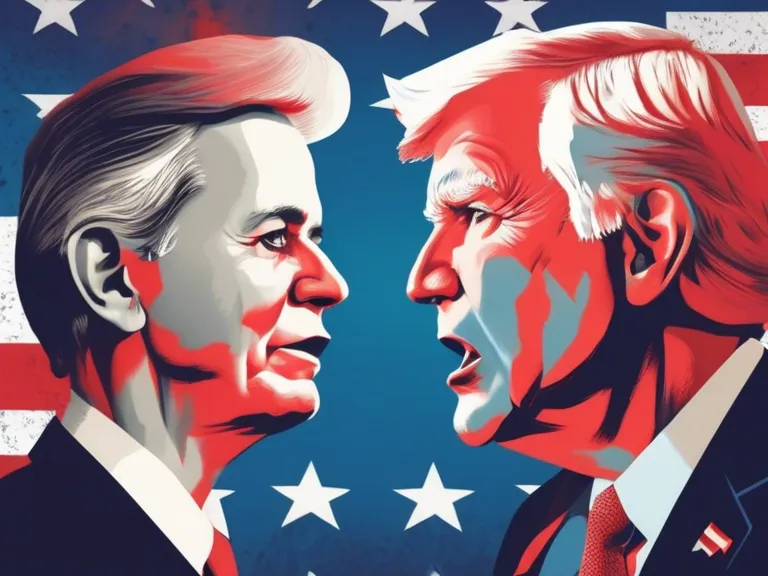
Introduction
Over the past decade, Bitcoin has emerged as a disruptive force in the financial world, challenging traditional banking systems and offering a decentralized alternative for transactions. Beyond its economic implications, Bitcoin has also played a significant role in shaping political discourse globally. This article delves into the influence of Bitcoin on politics and how it has impacted various aspects of governance and policymaking.
Bitcoin as a Tool for Economic Empowerment
One of the key ways in which Bitcoin has influenced political discourse is through its role in promoting economic empowerment. By providing a decentralized and transparent platform for financial transactions, Bitcoin has empowered individuals and communities to bypass traditional banking systems and take control of their finances. This has led to discussions around financial inclusion, economic sovereignty, and the redistribution of wealth.
Bitcoin and Government Regulation
The rise of Bitcoin has also sparked debates around government regulation and oversight. While some argue that Bitcoin's decentralized nature allows for greater financial freedom and privacy, others raise concerns about its potential use in illicit activities such as money laundering and tax evasion. Governments around the world have grappled with how to regulate Bitcoin, leading to discussions on the balance between innovation and regulation in the digital currency space.
Bitcoin as a Political Tool
Bitcoin has also been used as a political tool to fund campaigns, support causes, and challenge existing power structures. Political candidates have accepted Bitcoin donations, and advocacy groups have used the cryptocurrency to raise funds for various initiatives. This has raised questions about the transparency of political donations, the role of money in politics, and the potential for Bitcoin to disrupt traditional fundraising methods.
Bitcoin and Geopolitical Conflicts
The decentralized nature of Bitcoin has also made it a topic of discussion in geopolitics. As countries grapple with economic sanctions, trade wars, and currency manipulation, Bitcoin has emerged as a potential alternative to traditional financial systems. Some countries have even explored the idea of creating their own digital currencies to compete with Bitcoin, leading to discussions around the future of global finance and the role of cryptocurrencies in international relations.
Conclusion
In conclusion, Bitcoin has played a significant role in shaping political discourse by challenging traditional financial systems, sparking debates around government regulation, serving as a political tool, and impacting geopolitics. As Bitcoin continues to gain mainstream acceptance and adoption, its influence on politics is likely to grow, shaping the way we think about governance, economics, and power in the digital age.
alimentandolainocuidad.com
chrissyhelmer.com
dalamanisatiyorum.com
lacasadepedrolatincuisine.com
onechurchfilm.com
passionatecareinc.com
photojikan.com
pressnwear.com
steeplepointehomes.com
sustain-365.com
thegrapewineshop.com
throwdownthursdaypodcast.com
totalwheelworks.com
zelopro.com
aebill.com
aerialfitnessfactory.com
aikoubou-andon.com
armorarizona.com
atheeljewelry.com
bornwolfdesigns.com
boulevardbrasserie.com
colliermeyou.com
daanmogot-city.com
datasciencebeginners.com
dressingglobalbodies.com
estudiotraversaro.com
guraku.com
htdaviloz.com
idueforni.com
istanbulnakliyatsirketleri.com
janetsaw.com
kellyannsquilting.com
manicpaniccollection.com
minervarevista.com
nachwa.com
netokablog.com
onevirtualagency.com
pandaandpolarbear.com
qehtheatre.com
qlabdesign.com
re-mori.com
redenutri.com
shoestoshiraz.com
sienaleigh.com
sitstrongsystems.com
soldadonoelio.com
stacyboisvert.com
studiomanazza.com
thebattlelost.com
thefreemanview.com
thepresswire.com
thienduongtinhai.com
todorokigijyutu.com
yourwritinghelp.com
ad4gulf.com
airgatoradventures.com
allianceoffshoresupply.com
amygraycunningham.com
azaleayams.com
blipbg.com
blvproducts.com
cajuncoffeeshacktx.com
celalguntan.com
championcustomcarts.com
clothingbyandre.com
consolidate4free.com
cooperworkskilns.com
courtneysellfilms.com
daisychainproductions.com
dozensband.com
elevatebarbellclub.com
erumerch.com
eskisehirbmwservisi.com
eskisehirvolkswagenservisi.com
garnetsgold.com
gazzottivini.com
gggourmetgourmet.com
gitarkapok.com
gs-website.com
hottheaters.com
ichigashiraganka.com
immelresources.com
intotheoctahedron.com
iwantanap.com
janeoftarzana.com
japanesemonkeypants.com
kapsalonkarizma.com
kwikcarcredit.com
lewistutoring.com
lionslawyers.com
lydiafiges.com
midgefrazel.net
midtownfc.com
nyafoo.com
onelovethelabel.com
pandpheating.com
penggerakdaily.com
quailhollowkennel.com
quickstare.com
riverregionsoccerclub.com
scot-canoe.org
scottbrookshiredesign.com
sfr-kobe.com
smelettronica.com
sneakermestupid.com
starwishyou.com
stevesboatrentals.com
systemtrade-lab.com
theboomerrants.com
thedollshousesalon.com
therestsk.com
topdaddies.com
trinitychurchlighthousepoint.com
virtualescapeglobal.com
woodcarvingtron.com
202pages.com
5starelect.com
agenciagestiondigital.com
ashevillebit.com
automaticke-kavovary.com
balikrumah.com
belitha.com
bevonshire.com
centreofalignment.com
chadorsa.com
chuseto.com
cioe-online.com
creativehomehouseware.com
crescentchoirs.com
davidwebbarchitecturalmodels.com
derekjohnsonpage.com
faith-coffee.com
fehligbrotherslumber.com
fredguerin.com
gashiqoton.com
globaldescents.com
gonzalestree.com
healthkoop.com
ivanbrackenbury.com
janissmithlaw.com
jimmyselectricandac.com
jldgamingpc.com
joshkellymusic.com
jumarusa.com
justenjugheadallport.com
musicgoon.com
olivelimes.com
onlinekendo.com
paniolorealty.com
perzinacanada.com
reggieforohio.com
researchcmr.com
shamanshawn.com
taitai-taitai.com
theskygrill.com
thesteffesgroup.com
toothsomedocs.com
toriscustomart.com
toyotajogjacenter.com
travelensenada.com
agoraguajara.com
amidstbooks.com
amoremagicallife.com
appspcdb.com
belatone.com
bistrotletranger.com
blackmountainfirearms.com
casollo.com
castlewoodlion.com
centromeninos.com
cubedentertainment.com
freestone-media.com
gargleblastrecords.com
geesent.com
glimmernews.com
iifingersbar.com
jean-samuel.com
kamakura-qs.com
liminal-order.com
mdgolden.com
monkeychop69.com
telegraphik.com
thmaniah8.com
ulf-mask.com
ulfbiotech.com
best-shoopping.com
blutreestudios.com
chateaumaplewood.com
dulichnguyenhung.com
fordlawfirmpllc.com
gandtblog.com
iwishihadapenguinfriend.com
kbresre.com
kimihime.com
manggih.com
marcelogoes.com
mustlovedanesrescue.com
nangluong-mattroi.com
nicolemidwest.com
paulinevknguyen.com
seleneboutiquesorrento.com
shanghai-culture.com
singturmg.com
thefantasyguide.com
theholygeek.com
thepressshopnyc.com
transportreloaded.com
whereeverigo.com
askchrisknight.com
askchristopherknight.com
berkshirefoodjournal.com
cchirosw.com
coastalcottagesnl.com
destinationsite.com
finulldraft.com
gardenstatepaintingnj.com
impacthound.com
inneddi.com
itazurakoneko.com
judyforaz.com
localcarsnow.com
lovedayscinema.com
matiqistiqomahsambas.com
meetborofive.com
morskicovik.com
naturesrewardphotography.com
regenerativeresorts.com
restaurant-nashvilletn.com
scoopsicecreamtruck.com
simmonsmotorworks.com
trinityeco-tours.com
uncoverstudios.com
wong-multimedia.com
123exp-government.com
abozymes.com
atsheatingandair.com
bemjavim.com
caseintrend.com
cdnxbvn.com
charangolibre.com
denis-latin.com
frugal-science.com
fukuoka-kouyaren.com
hanabisou.com
herculessportcenter.com
highvoltageloja.com
hlwstoryboard.com
juderabig.com
leauxandbehold.com
melurix-next.com
moggiechicken.com
mytrendysins.com
nativeskinonline.com
ninethreestudio.com
pcmwereld.com
pichinkufibers.com
primerautobody.com
salmanhatta.com
shalevbrosh.com
sosorryrecords.com
sportsone-egy.com
wofome.com
ycadeau.com
abalawpc.com
airportpawnmiami.com
alchemycollaborative.com
blackfigdesigns.com
cubemedica.com
deliciousyarns.com
denledamtrancaocap.com
denledpanelcaocap.com
futebolrico.com
honsyuji.com
jayasupranaschool.com
jstact.com
kikichaos.com
knuckleupmartialarts.com
lavi-furniture.com
maisonsecomatiq.com
neighbors-construction.com
nspointers.com
opticiwear.com
richouli.com
soddydaisyhealthcare.com
soultalkmagazine.com
studywithpmouy.com
swordfightsandstarrynights.com
tamatur-bali.com
thepainreliefsecret.com
townhouselinens.com
vchainstore.com
vormaro.com
yukonlodgeforsale.com
airkoolny.com
an-geeke.com
bajka3.com
bertinoargenti.com
birolkitabevi.com
burikoland.com
emeraldseamless.com
floridanativecharters.com
iptvsportt.com
jupiterboutique.com
kateronline.com
kustomkoachrv.com
lademeuredufondateur.com
lucianamurta.com
luckydelaware.com
luckyindiana.com
lujannavas.com
mike4rep.com
milioshairsalon.com
movingrestaurantequipment.com
openseedvault.com
retrogradetours.com
revistaresiduos.com
roughandreadygrange.com
therusalka.com
toxnfill3.com
valleymaintenancelandscape.com
violetorlandi.com
wanpaku-golf.com
zinkdental.com
suryacctv.com
tuvannugioi.com
mandalynmusic.com
wireless-reviews.com
tussingblockwatch.com
greenteaphotography.com
jennierooney.com
vietamreview.net
kyavar.com
market-truth.com
alexandregaurier.com
omegagadget.com
banditosla.com
nursememama.com
oyunbilim.com
acme-nuclear.com
agilityimap.com
akikcombong.com
anniesmysteries.com
bflofoodie.com
brandzonestudios.com
cacemar.com
daperezlaw.com
denvyautomation.com
eugeneband.com
factory-eshop.com
florentdumas.com
hishaywireless.com
in2-signs.com
kuwekeza-holdings.com
mitaniya-ltd.com
mixfoure.com
mobilitypluspro2.com
moipravila.com
montreal-business-kit.com
mortiseandmiter.com
nextdigitaldental.com
nurdalilahputri.com
oem-phoneaccessories.com
palmbeachestepona.com
precavida.com
roscoeandetta.com
scriptsnmacros.com
sringserver.com
thecustomfairy.com
withlovefromangela.com
applebyandwood.com
auzigog.com
eac-w.com
homesbyelevation.com
nihilismforoptimists.com
slavonkandhortus.com
thekoreanpolitics.com
turningpointpt.com
val-up.com
wakansen.com
3dideation.com
achilles-fire.com
banatelhalal.com
biyografirehberi.com
bohams.com
comisiondeestudios.com
cooride-net.com
danayumul.com
ecadecom.com
edwardscornerfarmersmarket.com
ekspresif.com
ellajmae.com
ginroecooks.com
gracefueled.com
hightidekitchen.com
jeroenswolfs.com
marthalott.com
mollybroekman.com
mpthoidai.com
plumfashionpr.com
racktents.com
solzapower.com
southcoastbehavioralhealth.com
the101bali.com
thearguide.com
theartistfia.com
thefitnesswire.com
thelivelihoodproject.com
thelynndentonagency.com
wilkespoolsnspas.com
wjwatson.com
drinkganbei.com
mendenhallnews.com
nathaliemoliavko-visotzky.com
nationalinfertilityday.com
wide-aware.com
ashleymodernfurniture.com
babylonbusinessfinance.com
charliedewhirst.com
christianandmilitaryhats.com
hypnosisoneonone.com
icelandcomedyfilmfestival.com
kayelam.com
mlroadhouse.com
mumpreneursonline.com
posciesa.com
pursweets-and.com
rgparchive.com
therenegadehealthshow.com
travelingbitz.com
yutakaokada.com
22fps.com
aarondgraham.com
essentialaustin.com
femdotdot.com
harborcheese.com
innovar-env.com
mercicongo.com
oabphoto.com
pmptestprep.com
rmreflectivevest-jp.com
tempistico.com
filmintelligence.org
artisticbrit.com
avataracademyagency.com
blackteaworld.com
healthprosinrecovery.com
iancswanson.com
multiversecorpscomics.com
warrenindiana.com
growthremote.com
horizonbarcelona.com
iosdevcampcolorado.com
knoticalpr.com
kotaden.com
la-scuderia.com
nidoderatones.com
noexcuses5k.com
nolongerhome.com
oxfordcounselingcenter.com
phytacol.com
pizzaropizza.com
spotlightbd.com
tenbags.com
thetravellingwilbennetts.com
archwayintl.com
jyorganictea.com
newdadsplaybook.com
noahlemas.com
qatohost.com
redredphoto.com
rooms4nhs.com
seadragonenergy.com
spagzblox.com
toboer.com
aumantvmuseum.com
beyondausten.com
citylabstudio.com
diskonio.com
drinkcf.com
eft-dongle.com
emilymeganphotography.com
evolveathleticclub.com
godleystationvet.com
hirochanweb.com
homeonefurniture.com
ifiwasastylist.com
lacantinepopup.com
liriklagubatak.com
lo-ko.com
mensagenseatividades.com
myway-zeus.com
nevadadec.com
nokarikhabar.com
nuuuki.com
quenchpad.com
sckyrock.com
tindunghanoi.com
tradeshows-biz.com
wikimuzik.com



